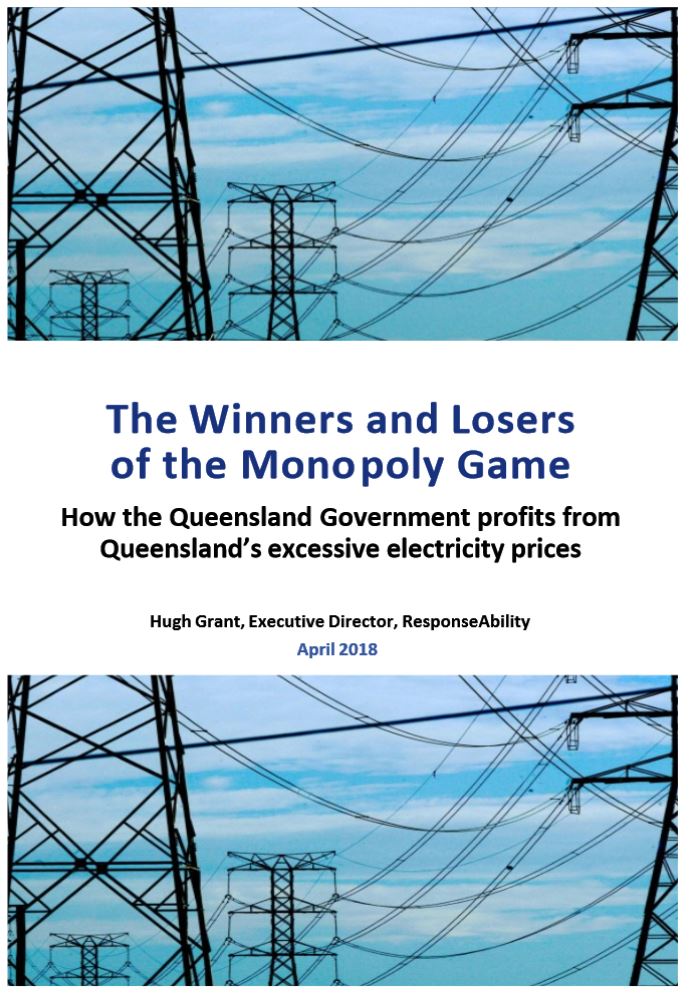Farmers blow whistle on government 47% power bill take
For every $100 Queenslanders pay in network charges on a household or business electricity bill, the State Government takes $47.
The revelation is in a report commissioned by sugarcane growers’ group CANEGROWERS to get a clear picture of the drivers behind rising electricity prices and where the money ends up.
“It’s shocking reading,” CANEGROWERS Senior Vice-Chairman Allan Dingle said. “This report exposes how successive Queensland Governments have enabled the electricity networks to exploit consumers in the pursuit of excessive profits – electricity is a cash cow for government!
“It’s very rich for the State Government to be posturing over the proposed National Energy Guarantee when a large portion of the problem lies within its control.”
Compiled by Hugh Grant, The Winners and Losers of the Monopoly Game examines the profitability of the electricity networks.

“For every $1000 irrigators pay in network charges watering their crops, the government gets $470. This is true for everyone using electricity.
“Increased network charges accounted for 95% of the 2007-08 to 2013-14 electricity price hike while generation and retail costs have remained stable.
“Governments have been getting away with this for too long – but their time is up.
“The community is becoming increasingly aware of the real reasons for excessive electricity prices.
“CANEGROWERS commissioned this report to get some facts and numbers out in the open to lay bare what everyone knows – we are being ripped off.”
CANEGROWERS is calling for Queensland to take a leaf out of the book of governments in other states and stand up for electricity users – for households trying to balance budgets and businesses trying to contribute to the economy.
“We are saying that Queenslanders will no longer be played as fools,” Mr Dingle said. “We need the political parties to stand up for us. I’ve never heard anyone ask for a price increase, but a decrease is on everyone’s lips.
“In October last year the NSW government directed Essential Energy, its government-owned distribution network, to set its prices at 34% below the level that Essential Energy managed to game from the national regulatory framework.
“It did that in response to community outrage following the leaking of a document that confirmed that Essential Energy cynically exploited its consumers, the regulator and the Australian legal system in its pursuit of excessive profits.
“If NSW can do this, so can Queensland,” Mr Dingle said.
The report shows that in every year over the past three years, the Queensland Government extracted more income from the networks than they have created which is an unsustainable situation.
“This cash cow mentality is threatening the long-term viability of industries like irrigated agriculture, with flow on impacts in regional Queensland,” Mr Dingle said.
“If that $470 out of every $1000 stayed in farmers’ pockets instead of going to the government, it would be spent in their local areas supporting other businesses and jobs.
“A ‘business as usual’ approach to power prices from government is not an option.”
The report contains four recommendations to stop the power price spiral:
- Set the Queensland networks’ prices at efficient levels
- Revert to Queensland Government-controlled regulation for the Queensland networks
- Implement fiscal controls that restrict the Queensland Government’s income extractions to sustainable levels
- Strengthen the oversight of the Queensland networks.
CANEGROWERS is part of the Queensland Industry Energy Alliance along with the Queensland Farmers’ Federation, Chamber of Commerce and Industry Queensland and the Refrigerated Warehouse & Transport Association.
The Alliance is calling for electricity prices to have a ceiling of no more than 16c/kWh, comprising 8c/kWh for the network and 8c/kWh for the electricity. The report demonstrates that this is a sustainable electricity price.
The Winners and Losers of the Monopoly Game is available here: https://bit.ly/2HsZKrS

.jpg)